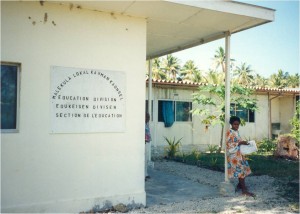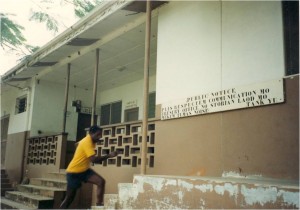Traders, Missionaries, Blackbirding
no images were found
While the early explorers of Europe came, baptized the islands and left, their successors thought that they had found a treasure chest in the islands. Seamen plied the seas of the South Pacific for whales. They also discovered that sea-slugs–valued in China as a spice and aphrodesiac–were abundant in the waters of the New Hebrides. On the island of Aneityum sandlewood–a fragrant, delicate tree–grew wildly.
Traders established themselves on Aneityum and elsewhere, setting up themselves as sandalwood-sailor intermediaries and introducing the indigenous islanders to the manufactured goods of Europe. It was the trader network which brought a cash economy to the New Hebrides.
Sea-slugs and sandalwood were not the only material attractions the New Hebrides held out for Europeans. With the expansion of the sugar plantations in Queensland, Australia, New Hebridean men were looked upon as a source of cheap labor. Thus began the blackbirding period. New Hebrideans were encouraged to sign up for agricultural work in Australia for years at a time, in a kind of indentured servant arrangement.
But when voluntary recruitment did not satisfy manpower requirements, blackbirders took to involuntary recruitment. Thousands of islanders were kidnapped by outright coercion or under false pretenses to work in the fields of Australia. In practice, blackbirding often differed little from slavery, with one important exception: most islanders were eventually repatriated.
Along with their meager savings, New Hebrideans returned home with a new language: Bislama, a kind of simplified of “pigin” English that enabled Melanesians to communicate with each other throughout the archipelago.
Not all white men came to Melanesia for profit–some came to save souls. Christian missionaries looked upon the so-called natives at heathens and pagans who needed to be introduced to Jesus Christ for their own salvation. The earliest missionaries were not all welcomed with open arms. Some, such as John Williams were killed and probably eaten; cannibalism was rather common throughout Melanesia in the nineteenth century.
| Walter Lini on Cannibalism |
But others, such as Bishop George Selwyn of New Zealand, John Geddie of Canada and Father Emmanuel Rougier were more successful and set up mission stations, many of which remain to this day.
Missionaries were often at odds with each other, particularly when they represented different versions of the Faith. Protestant missionaries, particularly Angelicans and Presbyterians, both feared and despised their Roman Catholic counterparts. Missionaries, often the sole white people on certain islands, could go years without speaking to each other, especially if they were of different Christian faiths.
An unofficial demarcation evolved: Angelican missions could have the Northern Islands to themselves, Catholics could concentrate on Santo, Malakula and Efate, and Presbyterians would go anywhere. The division was not watertight, though, so religious competition permeated the entire archipelago. On islands such as Pentecost and Tanna, missionary competition was particularly intense.
Overlying the religious rivalry was a national one. While most Protestants hailed from the British empire (particularly Australia and New Zealand), Catholic missionaries were generally French. In the late nineteenth century both Great Britain and France coveted overseas territory. Melanesia did not escape this territorial hunger of these European superpowers. France already had a colony in nearby New Caledonia, whose claim to infamy was a penal settlement.
A real estate company backed by the French government began buying and claiming huge tracts of New Hebridean land under rather dubious pretenses. French settlers built coconut plantations for the production of coprah, which was useful as an oil extract. Later they also moved into cattle ranching. France was eager for outright colonization to consolidate these land holdings and to protect its settlers.
Britain, on the other hand, had already staked its claim to Fiji and the Solomon Islands and was less eager to intervene on behalf of the English-speaking private companies which were conducting business in the islands. But pressure for British intervention came from Australia, itself a British possession. Australians did not appreciate having one French convict island already in their backyard, with the possibility of ex-cons taking over islands even closer! Worse, most had been Catholic convicts!
So Great Britain and France came to an unusual arrangement in the New Hebrides. Both powers would exercise custodianship over the entire archipelago. Each would have its own police force, judicial system, medical services and school system. In cases of legal conflict there would be a joint court composed of a French and British judge, but presided by a Spaniard jurist–in honor of the original “discoverer,” Fernandez de Quiros.
| Jimmy Stephens on the Differences Between the French and the British “The French wanted to teach you agricultural, practical work. You go to school, you come back, then you work on the land. Feed the cattle, feed the pigs, agricultural work. But the British, they taught you by bringing along their Bible. They wanted you to know that the Master [on high] was soon to come. The British were different in that respect. With the French, once you went to school you didn’t go to Church anymore. [In their Church] a bishop or a priest would make some sermon, and the Bible was there if you wanted it. But with the British, everyone had to have his own little Bible. Because everyone had to study, and to prepare, since the Lord might come at any moment. And there was another way they were different. The French wanted you to work with hammer and nails, with axes and trowels. With the French it was “la terre”–the earth, preparing the soil. But the British wanted to prepare the coming of the Lord. And I, I didn’t know who this “Master Lord” was, because I hadn’t been to school. I’d been brought up with all sorts of old timers–Germans, Russians, and all other kind of tough people. They’d walk around with guns, revolvers, pack45s. They’d speak to you once, twice. If you didn’t listen to them the second time, they’d just shoot you. Bam!” |
Britain and France would be jointly in control: the inhabitants of the islands, in contrast, were left completely stateless. This bizarre colonial arrangement, concocted in 1906 and formalized in 1914, became known as the Anglo-French Condominium of the New Hebrides. Due to the duplication and unworkablilty of the system, “pandemonium” was the more accurate description!
| Walter Lini on the Condominium |



